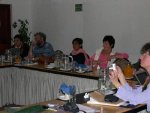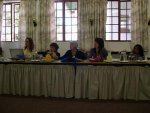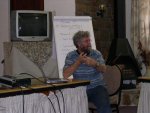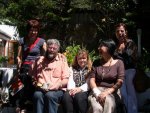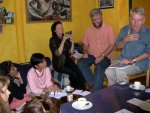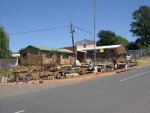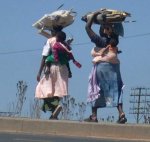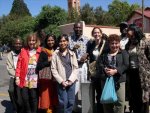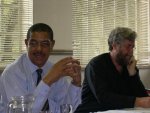
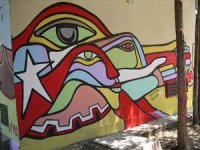
Publicado el 14 de marzo de 2007
Traducciones disponibles en:
français (original) .
Meeting 7-11 October 2006 - Cape Town, South Africa
Report of the international facilitation committee
Methodological approaches
From local to global and global to local
Present:
Sub-Sahara Africa
- John STEWART (Zimbabwe)
South East Asia
- Pinky Castelo-CUPINO (Philippines)
- Sudha SREENIVASA REDDY (India)
Pacific
- Betsan MARTIN (New Zealand)
South America
- Isis de PALMA (Brazil)
- Rachel TRAJBER (Brazil)
- Carlos LIBERONA (Chili)
- Tania PATINO (Colombia)
North America
- Nina GREGG (US)
- Cécile SABOURIN (Canada)
- Fabienne PRESENTEY (Canada)
Greece
- Yolanda ZIAKA
- Sonia KANDYLI
Georgia
- Tsisso CHIPASHVILI
General Coordination:
- Edith SIZOO (Netherlands, France)
Web-site and Forum
Lydia NICOLLET
FPH – Gustavo MARIN
Absent:
- ZHAO Yifeng (China)
- Diego ESCOBAR Diaz (Colombia)
- Amina RACHID (Egypt)
- Ziad MAJED (Lebanon)
- Sidiki DAFF (Sénégal)
After its first and second meeting in respectively Greece (Syros, October 2003) and Chili (Santiago, January 2005), the third meeting of the International Facilitation Committee of the Charter of Human Responsibilities took place in South Africa, Cape Town, from 7 - 11 October 2006. The meeting was preceded by an "immersion" in South African civil society by way of visits to a variety of organisations in Johannesburg and Cape Town.
The complicated organisation of this unforgettable experience was taken care of by John Stewart who, though based in Zimbabwe, managed to host the "immersion" as well as the meeting itself in a most competent and heart-warming way. Our admiration and gratitude to him are beyond words.
The exchange of experiences and reflections of this third meeting of the Committee were concentrated on methodological approaches and ways of increasing internationalisation of the work around the Charter.
To facilitate a well informed discussion, a questionnaire was sent around by the coordinator four months before the meeting and an Overview of the answers was distributed beforehand.
This exercise was meant to prepare the meeting 2006 in such a way that:
![]() the participants had reflected themselves on their own approaches,
the participants had reflected themselves on their own approaches,
![]() they were informed about those of others,
they were informed about those of others,
![]() time was gained because the information communicated beforehand did not need to be repeated during the meeting, and
time was gained because the information communicated beforehand did not need to be repeated during the meeting, and
![]() the agenda for the meeting was based on shared ideas for discussion.
the agenda for the meeting was based on shared ideas for discussion.
In this report, the results of the questionnaire and the discussions during the meeting itself are presented in Part II. They are preceded by a Summary of the Outcome of this meeting (Part I) that highlights the issues that were discussed and the conclusions drawn on each of these points. The discussions themselves are to be found in Part II of the full report. The focus of attention in both is on : A. Reflections on the ultimate objective; B. Concrete actions : choices of sectors and actors; C. Constraints on reflection and action; D. Methodological approaches : methods and tools; E. The way forward, and F. Final Conclusion on strategizing.
SUMMARY OF THE OUTCOME OF THE MEETING
A. Reflections on the ultimate objective
A prerequisite for the obvious idea of linking up within the committee and with others, is that the objectives of such an investment in time and money have to be clear in our minds.
Questions were raised on the presentation of our Charter as "the" "Third Pillar" for international life. There was preference for an approach of "a" third pillar and consensus that this should not be the immediate concern on which our efforts must be concentrated. Such would be a political project focussing mainly on lobbying national governments, international organisations and political leaders or stars. That project would be the end rather than the beginning of our endeavours.
When we started our common voyage, we decided that such a political objective could never be reached without a worldwide support in civil societies for the idea that responsibility (’R’) is the key-notion for facing the challenges of the XXI century. Therefore we decided to start with engaging in a process of raising awareness about a renewed and enlarged understanding of ’R’, using the Charter as a tool for discussions. This process is carried and inspired by a consciousness that in the end a universally accepted agreement that Human Rights, Peace and Development should be coupled with Human Responsibilities, is indispensable.
Conclusion on the ultimate objective
There is consensus in the Committee about making a difference between a forward looking long term "strategy" and shorter term "planning" of activities. The overall purpose of our strategy is, ultimately, a new international social pact which responds to the needs of the XXI century.
While keeping this in mind we have to be vigilant, use opportunities wherever they emerge, and plan activities which may contribute to reaching one day the ideal of this new social pact. On the road towards this goal, we will see many new agreements based on the key-notion of ’Responsibility’ emerging, locally, nationally, regionally and internationally, as well as according to professional disciplines. They may carry various names, but the important thing is the emergence of a worldwide consciousness that new social agreements based on the key-notion of ’R’ are imperative. One strategic implication is that the promotion of the idea of ’R’ and the Charter must be guided by the broader concern to create multiplier effects of what is set in motion by the members of the International Facilitation Committee and other related groups. This requires that attention is paid to which social categories and sectors are targeted, and equally which methods and tools for communication are given priority. Another implication is the importance of linking up across borders and sharing experiences internationally.
B. Concrete actions : choices of sectors and actors
The reports of the members of the international Charter committee refer to contacts made, discussions and activities realised with a great many groups of society. These are mainly to be found in the following fields of activity (sectors) and social categories (actors) which, of course, are partly overlapping.
Sectors
![]() education (formal as well as non-formal, secondary as well as academic) : Brazil, India, New Zealand, China, Canada, Philippines, Colombia
education (formal as well as non-formal, secondary as well as academic) : Brazil, India, New Zealand, China, Canada, Philippines, Colombia
![]() environment : Brazil, Greece, France, Italy,United States, New Zealand, Chile, Georgia, Canada, Philippines
environment : Brazil, Greece, France, Italy,United States, New Zealand, Chile, Georgia, Canada, Philippines
![]() Human Rights : New Zealand, Colombia, Chile, India, Canada
Human Rights : New Zealand, Colombia, Chile, India, Canada
![]() "Governance" : Lebanon, New Zealand, Brazil, West-Africa, Canada, Colombia
"Governance" : Lebanon, New Zealand, Brazil, West-Africa, Canada, Colombia
![]() economic justice : United States, Colombia
economic justice : United States, Colombia
![]() media : Brazil, India, Chile
media : Brazil, India, Chile
![]() business sector : Colombia, Brazil
business sector : Colombia, Brazil
Actors
![]() youth : India, Brazil, Chile, Senegal, Colombia, Zimbabwe, Philippines,
youth : India, Brazil, Chile, Senegal, Colombia, Zimbabwe, Philippines,
![]() women : India, Colombia, Canada, Aotearoa-New Zealand / Pacific
women : India, Colombia, Canada, Aotearoa-New Zealand / Pacific
![]() artists : Greece, Brazil, India
artists : Greece, Brazil, India
![]() indigenous groups : New Zealand, Philippines, Chile
indigenous groups : New Zealand, Philippines, Chile
![]() intellectuals : in all countries
intellectuals : in all countries
![]() religious groups/institutions : Chile, Senegal
religious groups/institutions : Chile, Senegal
![]() environmentalists/educators : Greece, Brazil, Aotearoa-N Z / Pacific
environmentalists/educators : Greece, Brazil, Aotearoa-N Z / Pacific
![]() journalists : Brazil, India, Chile
journalists : Brazil, India, Chile
![]() politicians : Brazil, Lebanon
politicians : Brazil, Lebanon
![]() citizens : all
citizens : all
![]() peace activists : Zimbabwe, Colombia, Canada
peace activists : Zimbabwe, Colombia, Canada
![]() the military : Chile, France
the military : Chile, France
![]() inhabitants : Senegal, West Africa
inhabitants : Senegal, West Africa
![]() fishers : West Africa
fishers : West Africa
![]() blind people : Chile
blind people : Chile
Conclusion on sectors, actors and activities
The reports of members of the International Charter Committee show a great variety of sectors, actors and activities. These are partly related to different opportunities, strategic options and choices made in different countries. In view of the need for multiplying effects, dissemination of the charter and establishing partners, it is important to note the time and effort involved in pursuing activities geared towards citizens, local actors and civil society organizations. The example of the Brazilian educational program under the auspices of the Ministries of Education and of Environment shows how governments can be vital actors for creating large scale and lasting impact on civil society.
C. Constraints on reflection and action
Constraints on stimulating reflection and action related to ’R’ are not all of the same kind. And so, they cannot be met in the same way either. They could be divided into environmental constraints (categorised as socio-cultural, economic and political conditions) and own constraints (financial and time-wise).
Summary of constraints
* Socio-cultural:
![]() The way in which the concept of responsibility has become a stock phrase in a social, cultural and economic environment overloaded with discourse about responsibility.
The way in which the concept of responsibility has become a stock phrase in a social, cultural and economic environment overloaded with discourse about responsibility.
![]() Moralising rhetoric, often linked to religious discourse, inducing feelings of guilt.
Moralising rhetoric, often linked to religious discourse, inducing feelings of guilt.
![]() The widespread conception of responsibility as an obligation imposed from above.
The widespread conception of responsibility as an obligation imposed from above.
![]() ’R’ is individualized and reduced to accountability in a legalistic and juridical sense (legal liability), a means to hold others responsible.
’R’ is individualized and reduced to accountability in a legalistic and juridical sense (legal liability), a means to hold others responsible.
![]() A prevailing ethos of practicality seeing no need for an added ethical dimension. ’R’ is seen as an established philosophical basis which does not need to be expanded.
A prevailing ethos of practicality seeing no need for an added ethical dimension. ’R’ is seen as an established philosophical basis which does not need to be expanded.
![]() Different socio-linguistic interpretations of the notion of ’R’.
Different socio-linguistic interpretations of the notion of ’R’.
* Economic constraints:
![]() There is a perception that thee more pressing issue is poverty and survival and claiming rights, rather than exercising responsibility.
There is a perception that thee more pressing issue is poverty and survival and claiming rights, rather than exercising responsibility.
![]() Violence and inadequate economic conditions preventing people to exercise their rights leading to "de-politisation of society", so why should they reflect on ’R’ ?
Violence and inadequate economic conditions preventing people to exercise their rights leading to "de-politisation of society", so why should they reflect on ’R’ ?
![]() Overcoming a feeling of powerlessness to act responsibly in a professional world which is out for efficiency, rapid profits, and as little interference as possible from employees.
Overcoming a feeling of powerlessness to act responsibly in a professional world which is out for efficiency, rapid profits, and as little interference as possible from employees.
![]() In business "corporate ’R’ often means a fund for charitable purposes or a tool for advertising strategies.
In business "corporate ’R’ often means a fund for charitable purposes or a tool for advertising strategies.
* Political constraints:
![]() In political rhetoric ’R’ has become a device to direct expectations away from government toward individuals.
In political rhetoric ’R’ has become a device to direct expectations away from government toward individuals.
![]() ’R’ is individualized and reduced to accountability in a legalistic and juridical sense (legal liability), a means to hold others responsible.
’R’ is individualized and reduced to accountability in a legalistic and juridical sense (legal liability), a means to hold others responsible.
![]() In political acting short term economic interests prevail above ’R’ for long term sustainability.
In political acting short term economic interests prevail above ’R’ for long term sustainability.
* Own constraints:
![]() Time needed for organising reflection including permanent follow-up
Time needed for organising reflection including permanent follow-up
![]() lack of financial means.
lack of financial means.
![]() The majority of the national Charter committees operate without institutional grounding.
The majority of the national Charter committees operate without institutional grounding.
Methods
Depending on the context, various methods were used to deal with constraints as mentioned under C. The following ones received particular attention:
![]() organising face-to-face exchanges
organising face-to-face exchanges
![]() creating a "mirror effect" : explain and provide a window for ’responsible’ actions which we know of, registered and wish to make known.
creating a "mirror effect" : explain and provide a window for ’responsible’ actions which we know of, registered and wish to make known.
![]() using the notion of ’R’ as focus for reflection on action.
using the notion of ’R’ as focus for reflection on action.
Conclusion on methods
There is a large consensus among the members of the facilitation committee that the most effective way of introducing the charter is to start with inserting face-to-face discussions on ’R’ into existing processes, activities, movements and professional circles. While doing this, the approach to be used is to take the notion of ’R’ as focus for reflection on action whether in the field of environment, peace making, education for sustainability, human rights, bio-agriculture, governance or democracy.
Tools
As the theme of the meeting was related to methodological approaches, considerable time was taken for presenting educational materials and tools for promotion of the Charter. Video’s, books, brochures, flyers, cards, posters, drawings (by children), a Charter bijou, Charter T-shirts and even a Spanish version of the charter written in Braille were exposed, shown and discussed. Explanations were given on how these tools were used.
Conclusion on tools : Specification of needs for other / more educational material
![]() A book resulting from a collective study on “The state of responsibility in the world of today” highlighting to what extent ’R’ is exercised (or not) at various levels of national and international society, and to what extent the notion of ’R’ is breaking through as a key-concept for the XXI century.
A book resulting from a collective study on “The state of responsibility in the world of today” highlighting to what extent ’R’ is exercised (or not) at various levels of national and international society, and to what extent the notion of ’R’ is breaking through as a key-concept for the XXI century.
![]() a video that shows all the initiatives, those of the International Facilitation Committee as well as others (the journalists, the juridical network, the military group)
a video that shows all the initiatives, those of the International Facilitation Committee as well as others (the journalists, the juridical network, the military group)
![]() a methodological kit including visual material, a methodological brochure, and a game. This kit should be appropriate for use with different sectors/ groups/ countries. Each country should contribute to the production of this kit.
a methodological kit including visual material, a methodological brochure, and a game. This kit should be appropriate for use with different sectors/ groups/ countries. Each country should contribute to the production of this kit.
![]() a CD showing all the material available
a CD showing all the material available
![]() a presentation of educational material used for environment education in schools
a presentation of educational material used for environment education in schools
![]() a new presentation of the existing Charter.
a new presentation of the existing Charter.
![]() A flyer and a short brochure, presenting the project as a whole (what is the Charter? History of its production, what kind of actions in each region…), focusing on its international dimension, on the actions of each national/regional committee and on the interregional linkages. There is a great need for an immediate production of such a material (in order – among others – to update the existing presentation and to show the advancement of the project since its beginnings), in various languages, appropriate for use with different sectors/ groups/ countries.
A flyer and a short brochure, presenting the project as a whole (what is the Charter? History of its production, what kind of actions in each region…), focusing on its international dimension, on the actions of each national/regional committee and on the interregional linkages. There is a great need for an immediate production of such a material (in order – among others – to update the existing presentation and to show the advancement of the project since its beginnings), in various languages, appropriate for use with different sectors/ groups/ countries.
E. The way forward
![]() Further linking up for concerted action beyond borders
Further linking up for concerted action beyond borders
o (inter-) regional plans
o World Children’s Conference : Vamos cuidar do Planeta !
![]() the Charter web-site as a common project and responsibility
the Charter web-site as a common project and responsibility
![]() Setting up a process for fundraising
Setting up a process for fundraising
![]() Revising the Charter
Revising the Charter
Linking up beyond borders
Before and during the meeting in South Africa, various plans for linking up between countries and between continents were worked out.
Conclusion on (inter-)regional plans
After three years of exploring the most effective methodological approaches to introduce reflection and action on ’R’ have shown that in spite of the fact that our societies share many of the resistances involved with the issue of ’R’, there are also encouraging results. These common threads between our differing societies are the ’windows of opportunity’ giving meaning to our linkages. By now enough experiences have been gathered for linking up beyond borders of countries and geographic regions. Plans are set up to realize links and collaboration on issues and pedagogical tools which have proved to be of common interest to the countries/groups concerned. They involve the following countries/regions/continents : Latin America, China & Korea, Asia & Pacific, Europe & Georgia, Europe & Asia, Europe & Brazil,, Canada & United States, Intra – Africa.
International Children’s Conference : Vamos cuidar do Planeta
Rachel Trajber gave an explanation of the big scale school/community educational program on Responsibility for the natural and social environment in Brazil, which was realized under the auspices of both the Ministry of Education and Environment, with 12.000 schools, reaching 4 million people, and culminated in a Nation Children Conference in the capital Brasilia. Following this explanation a long discussion was held about the feasibility of an International Children’s Conference based on the educational approach and experiences acquired in Brazil : "Vamos cuidar do Planeta". as well as the contributions members of the International Facilitation Committee can (and cannot) make.
Conclusion on International Children’s Conference : Vamos cuidar do Planeta
The committee agrees that this programme cannot be considered as a common international project of the Committee only, like for instance the intercultural book about ’R’ is not a common project of the Committee either, because the Committee as such is not responsible for the final results. But there is a very clear link between this World Children’s program on ’R’ and the International Charter Facilitation Committee, because it concerns the very heart of the issue which is the focus of our work. So, while not being our common project of which the Committee is in charge, each of us can contribute to it wholeheartedly within the limits of our possibilities. It is agreed that each of the members of the committee consult appropriate people at home and then send an advice to Rachel about the best in-roads in their countries (through central governments, or through other levels of public authorities or through civil society organisations, or all of them).
The Charter web-site as a common project and responsibility
![]() E-forum : for discussion and exchanges between internal partners, in French, English and Spanish; while Portuguese translations are done little by little in order to get more participation from the Brazilian local team and hopefully African Portuguese speaking people.
E-forum : for discussion and exchanges between internal partners, in French, English and Spanish; while Portuguese translations are done little by little in order to get more participation from the Brazilian local team and hopefully African Portuguese speaking people.
![]() The Web site : is meant for information to the internal partners as well as the larger public on regional and topical activities;
The Web site : is meant for information to the internal partners as well as the larger public on regional and topical activities;
![]() The Data base : is a useful tool for archiving, sharing and publishing data, making a link to the web to publish them.
The Data base : is a useful tool for archiving, sharing and publishing data, making a link to the web to publish them.
Conclusions about improvement of the web-site, e-forum and database:
a. For a more balanced regional representation in the web
More involvement from some of the regional committees on communicating on their activities. Especially East and Western Africa, North Africa and Middle East, and to a lesser degree, China, NZ. A more regular message from each member of the Facilitation Committee for the “What’s new in Charter land” (brief summary of the ongoing regional activities and results).
b. For a quicker data processing
One specific person in charge of the communication in each regional committee must be nominated (giving information on the ongoing activities + results + evolution of the regional committee + partners).
c. For a more autonomous data processing in the web charter
Any committee wishing to be trained to spip web editor to manage directly the regional pages can ask for Lydia’s assistance.
d. For better functioning of e-Forum discussions
One facilitator in charge of topical or regional working groups, collaborating with Lydia on both the web (sending her information to be published), the e forum (facilitation) and the data base (progressive training for an autonomous use).
e. Web pages presentation : look + structure info
A suggestion was made to make each regional page as if it is a first page, and not as an adjunct of the main charter web page. Then a link could be made from this regional page to the main charter website.
Send Lydia suggestions on how to improve the pages look and info organization.
f. Directories of the Regional Committees and partners (for web site and data base)
The presentation of the regional committees’ members and partners in the Charter web site should be regularly updated (and for some created). Essential for partnership.
Setting up a process of fundraising for Charter activities
Up till now funds for Charter activities have consisted of:
![]() 1. the FPH contribution (Euro 300.000 per year, divided into 14 equal contributions of Euro 15.000 per country / region represented in the Facilitation Committee plus costs for the Meetings of the Committee, the communication costs (web-site, forum, data-base) and the general coordination)
1. the FPH contribution (Euro 300.000 per year, divided into 14 equal contributions of Euro 15.000 per country / region represented in the Facilitation Committee plus costs for the Meetings of the Committee, the communication costs (web-site, forum, data-base) and the general coordination)
![]() 2. local contributions for local/national activities which in most countries exceed considerably the Euro 15.000.
2. local contributions for local/national activities which in most countries exceed considerably the Euro 15.000.
Apart from its contribution to the International Charter Facilitation Committee, the FPH also finances other partners of the FPH working on ethics beyond its own borders, like the Journalists Network, the Military Network, the Juridical Network, the China-Japan project on Ethics. In all of these networks one finds participation of members of the International Facilitation Committee or members of their national committees.
The members of the Committee agree that in general it is less difficult to find funds for specific activities at national level than to raise core funding for coordination and implementation of global activities. International agencies fund projects, but not processes. Moreover the latter type of fundraising takes a lot of time and money (which is not available within the committee) and a global identity, juridical status and a bank account. There might be possibilities though to form consortia (e.g. the European and Asian Charter groups) and apply for funds for specific programs at the European Union, Action Aid or Oxfam international, or for the World Children’s Conference.
Conclusion on fundraising
It is decided that the Committee will submit a proposal to the FPH for extra financial support for fundraising. This proposal will clearly and concretely show for which activities, where and when, funding is going to be sought and which funding agencies will be approached. To this end, each committee member will send to Fabienne/Cécile a calendar of the short term and long term activities in their country and the regional programs planned with budgets attached. The Canadian team will then work out a proposal to the FPH. A fundraising committee will be formed.
Revising the Charter
The idea of revising the Charter has to be divided in two aspects :
![]() a. the presentation of the Charter, and
a. the presentation of the Charter, and
![]() b. the Principles of the Charter.
b. the Principles of the Charter.
There is a general consensus in the international Charter Committee that the presentation of the Charter has to be up-dated and made much more attractive, more appealing, less abstract. This can be done rather quickly. The various brochures and flyers made by the members of the Committee for their own contexts are a rich source of inspiration for a new presentation of the Charter. With regard to the principles, it is felt that this requires a much longer preparation and in-depth study of what has happened to the principles when used in the various geographic, linguistic and cultural, social and professional contexts.
Conclusion on revising the Charter
A proposal was accepted to form a working group within the committee to prepare a draft for a revised version of the presentation and the principles, eventually in two phases. The first thing for everyone to do is to send all critiques and proposals that came up during the many discussions with groups and individuals to this working group so that an analysis can be made to what extent a reformulation of the principles is necessary.
F. Final conclusions : Strategising
The preceding chapters highlighting reflections on the ultimate objective, concrete actions already taken, constraints met on reflection and action, methodological approaches and further linking up beyond borders, allow for indications on how to "strategise" the way forward. There is consciousness that new social pacts based on the key-notion of ’R’ are imperative to finally reach an agreement on an international social pact. This implies that :
1. a broad international basis has to be created in order to put pressure on decision makers at national and international level, a basis that must be built and sustained on solid regional grounds, avoiding the top down effect of many international efforts.
2. the choice of sectors and actors has to be made in view of their multiplier effects; these are found in particular in the sectors of education, environmental sustainability, governance, Human Rights, business, economic justice and peace. The actors include not only citizens and civil society organisations but also governments where appropriate.
3. the choice of activities, methods and tools has to be made in view of the above mentioned 2 points
4. linkages between the national Charter committees is imperative as well as building and reinforcing their respective regional roots
5. the Charter web-site as a common responsibility is indispensable
6. extra fundraising is imperative
7. a revision of the presentation of the Charter and eventually adapting its principles is necessary.

